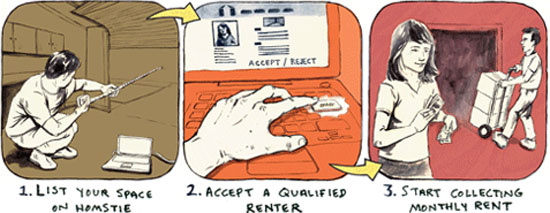First published April 2009 | A recession-induced need for cash, and an ever-growing infrastructure enabling individuals to act as (part-time) entrepreneurs, are fueling concepts that help ordinary consumers make money instead of just spending it. 

Good things come to those who sell
In many of our previous monthly briefings and annual reports, we’ve highlighted consumers who no longer just, well, consume, but actually create, participate and contribute.
Now, the economic recession is 'helping' to spread this ever-evolving trend among cash-strapped ordinary consumers (as opposed to just 20-something digital 'Wunderkindern' ;-). Expect plenty of novel ways for consumers to make some money on the side.
After all, if saving is the new spending, then making money—from selling personal assets, properties and creations—outshines saving.
In a nutshell:

SELLSUMERS: Whether it’s selling their insights to corporations, hawking their creative output to fellow consumers, or renting out unused assets, consumers will increasingly become SELLSUMERS, too. Made possible by the online revolution’s great democratization of demand and supply, and further fueled by a global recession that leaves consumers strapped for cash, the SELLSUMERS phenomenon is yet another manifestation of the mega-trend that is 'consumer participation'.
SELLSUMERS' staying power is considerable for a number of reasons:
Being in control of one's destiny
Human beings forever fantasize about control, about being in charge. SELLSUMERS represents the unlocking of these existing needs and wants in a new way; being one's own boss, even if it's only for three hours a week, is just too tempting to forego.
Experience rules
For decades, people in mature consumer societies have been trained to become experts in business, marketing and advertising (read: to see through the BS and to understand the underlying workings of being marketed to). The business of business has become something that interests producers and consumers alike. No wonder SELLSUMERS are confident enough to try their hand at (tiny) businesses of their own.
Showing off business acumen
On top of that, as Big Business is increasingly seen as being behind the times, and niche startups are stealing the show, showing off one's business acumen as a SELLSUMER yields personal status.
Providing 'premium obscure' or just plain dirt-cheap
SELLSUMERS provide other consumers with 'premium obscure' products and services and experiences—different, hard-to-find, special, vintage, quirky, and/or personalized. Equally important in recession times: unburdened by massive cost structures, some SELLSUMER offerings are dirt-cheap.
Oh, and let's face it, most people welcome a bit of extra cash, in bad and good times.


Just to be clear: the SELLSUMERS trend is not about individuals starting a business as a primary source of income (something that of course has been an ongoing trend for more than two decades, and is spiking again as we speak, with many a laid-off professional deciding to go it alone). At most, we're talking a secondary or even tertiary source of income.
It's also not about:
- All consumers becoming SELLSUMERS: nothing ever applies to everyone.
- No longer spending: SELLSUMERS are still consumers, too.
- Making money off capital (that's investing).
- Bartering and swapping (that doesn't yield cash!).
- Efficiency, discounts, free stuff etc (that's about saving money by spending less).
And in case you were wondering how this drive for cash corresponds with our recent GENERATION G briefing and consumers being more generous: being a SELLSUMER doesn't mean that one stops being generous in other areas in life. Remember, in trends, it's always about AND, hardly ever about OR ;-)

SELLSUMERS is yet another manifestation of 'consumer participation' and consumer power.
The act of doing business will help SELLSUMERS feel a bit less like string puppets. And the successful ones may even feel superior to behind-the-times corporations. In that sense, it's yet another nail in the coffin for the traditional one-way consumer arena.
There are countless SELLSUMER examples to showcase, but—as regularly requested—we’ve tried to keep the briefing shorter this time, categorizing a smaller number of examples into ‘SELLSUMER & PROPERTIES’ and ‘SELLSUMERS & CREATION’. We're also skipping well-known trading platforms, focusing instead on (somewhat) newer innovations in this space. Here goes:

Let's look at existing assets first: there are now plenty of (novel) ways for consumers to capitalize on anything they already possess, from unused parking spaces to excess energy. So what's being done besides firmly established SELLSUMER marketplaces like eBay?
Space

- Parking spots | Parkingspots.com connects those who have parking spots to rent out with those who need them on a monthly basis. The Toronto-based company lets spot-holders in the US and Canada list their off-street parking spots, along with the price they want to charge.
A similar service is offered by ParkAtMyHouse, operating in the UK, Ireland, Canada, US, Australia, New Zealand and The Netherlands. Fun detail: car owners can pre-book a spot daily, but can also make one-off bookings for a football match or a day of shopping in the city.
Also check out UK based YourParkingSpace and Boston and New York based SpotScout. - Storage | Los Angeles-based Sparefoot offers listings for excess storage space, collecting fees for featured listings and for providing custom lease agreements. Also check out Store at My House.
- Camping | Swedish Single Spot Camping offers a P2P camping solution by connecting anyone who owns a suitably sized piece of land with anyone looking for a place to pitch their tent. Listings cost the landowner a mere EUR 40 per year.
- B&B | Air BnB is an online marketplace that allows locals to earn money by renting out their extra space as alternative lodging for hotel-weary travelers. Also see Roomorama.
- Any space | Combining all of the above, UK-based Spareground is a marketplace for just about any kind of unused space. Consumers with space to share simply create a listing with its description, location and price. Those seeking space search by category or keyword and then contact the owner directly to arrange the terms.
Eco
Green SELLSUMERS looking to reap the spoils of ECO-BOUNTY will want to check out the following initiatives:
- In California, the Assembly Bill 1920 (also called the Solar Surplus Power Bill) will enable solar power-producing consumers to be paid by their utility company for any excess electricity they generate on an annual basis. Michigan, Minnesota and Rhode Island are considering similar legislation.
- Irish Energy Minister Eamon Ryan recently announced incentives for Irish households to sell excess energy, guaranteeing EUR 0.19 per kWh for the first 4,000 installations around the country. Said Ryan: "Before you received your power from a central source and paid for it. Now you can generate for yourself and be paid for the excess you don’t use. This type of on-site electricity generation will put more money into consumers’ pockets."
- In the UK, Ecotricity pays customers who want to sell back to the grid 12 pence per kWh, while Green Energy offers a Home Green Generator plan for those producing less than 6 kWh.
- In Australia, under the Electricity Feed-in (Renewable Energy Premium) Act 2008, Canberrans can sell energy back to the power grid. Starting July 2009, they'll be paid a tariff that's 3.88 times the retail cost of electricity for the energy they feed back into the grid for up to 20 years from the date they sign up to the scheme (source: Wikipedia).
Three more good wiki links for SELLSUMERS who are interested in going green: Eco-metering, Smart Grid and Micro-generation.
Other

- Gift cards | GiftCardRescue is a service that allows users to exchange their unwanted gift cards. Consumers create an account and provide details of the card they have and GiftCardRescue will indicate the redemption value it's willing to pay. Consumers can then elect either to receive cash via PayPal, or they can select a new gift card from the site, up to the redemption value of their original card.
- Sex | For uninhibited SELLSUMERS, there's money in peddling their bodies, if not bedroom antics. Needless to say, this is not for everyone, and there's definitely a serious risk of minors going too far in their quest for extra revenue. But for consenting adults, a site like Sell Your Sex Tape (WARNING: Seriously Not Safe For Work) are yet another way to cash in: the company promises to pay USD 2,000 to "cute young couples who document their love life on camera for one week."
- Hiring | New Zealand-based Hire Things offers an online marketplace for 'micro-hire-businesses.' Think everything from tableware to boats.
- Advertising | French 'carvertiser' Liberty Drive offers a program that rewards Smart car owners in France and Switzerland for participating in carvertising campaigns, paying them up to EUR 100 per month if they turn their cars into driving billboards. Makes us wonder: what about other SELLSUMER properties that could do with a bit of (not too flashy or too gimmicky) paid advertising? Boats? Caravans? Bikes? Houses? Clothing? All yours ;-)
- Jewelry | Red Swan offers money in exchange for unwanted jewelry. Once a user has sold jewelry to the site, they can become a ‘lead’, encouraging friends to participate in the service and earning commission on their sales.
For similar concepts, check out Ex-Boyfriend Jewelry and My Gold Party. The latter facilitates Tupperware-style parties that help guests sell excess baubles. The company sells the equipment that SELLSUMERS need to host gold-selling parties, including a scale, a karat tester and an instruction manual. - Gardening | Based around the concept of cooperative gardening, Veggie Trader is an online marketplace offering the opportunity to buy, sell or trade homegrown produce.
- Delivery | French site Colis-Voiturage aims to bring together those with a package to send and SELLSUMER drivers who are already planning a trip to a similar destination. Also check out German raumobil.

While countless creative SELLSUMERS are already making money from their designs, software, sculpting, knitting, manufacturing and so on, we've only seen the tip of the iceberg.
Expect a skilled, handy and brainy SELLSUMER 'workforce' to genuinely blossom when the youngest generation takes over. They'll not only be the first generation to be fully 'wired', but also the first generation to be completely comfortable with taking on the roles of both consumer and producer.
In the meantime, check out these random spottings for inspiration:
Design and manufacturing

- SELLSUMER-posterchild Etsy now boasts 200,000 SELLSUMERS and over 3 million products. In 2008, the value of products sold was USD 87.5 million, and the first two months of 2009 have already produced sales of USD 20.2 million.
- Much publicized Ponoko allows SELLSUMERS to make and sell everything from jewelry to furniture. In addition, the PonokoID feature invites shoppers to post requests, which professional and 'amateur' designers then bid to fulfill.
- North Carolina-based Spoonflower lets users design and print their own fabrics for USD 18 per yard with no minimum order. When Spoonflower comes out of beta, it plans to allow fabric designers to sell their fabrics on the site.
- And no, we’re not forgetting offline SELLSUMER retail/marketplace concepts: in Troy, Michigan, Oakland Mall has placed 12 kiosks throughout the mall, which can be leased for as little as USD 300 for a weekend. The flexible leasing terms are part of an ongoing program that aims to help SELLSUMERS sell seasonal offerings.
Also check out Beehive Co-op, which allows SELLSUMERS to rent a portion of stores in Atlanta and New York in exchange for a monthly fee and at least four hours of staffing assistance.
Equally interesting: inQbox—which stands for 'incubation in a box'—now operates six stores in Singapore and Malaysia, each of which is stacked with flexible shelving units. It rents out single box units to creative SELLSUMERS, providing them with retail and gallery space, and takes care of the daily hassle of retail. Prices for a box start at SGD 80 (EUR 40 / USD 50) per month.
Content & software

A 'redesign me' challenge by tea brand Pickwick
- Blogging | In Sweden, free newspaper giant Metro hosts Metrobloggen, a get-paid-per-view blogging service. Anyone can set up a blog at Metrobloggen and as soon as an individual blog achieves 5,000 page views per month, Metro sends the author a MasterCard that's credited with 150 Swedish kronor (USD 20 / EUR 16).
- Phone-based advice | By signing up for a free Ether number (which is forwarded to any regular phone number), SELLSUMER experts—from holistic life coaches to PowerPoint wizards—can charge their customers per hour, minute, or call.
- Apps | SELLSUMERS with application development skills can now make a few bucks at the iPhone App Store, Google’s Android Market, Blackberry's App World and the upcoming Palm App Catalog and Microsoft SkyMarket.
- Ads | While Google AdWords still brings in the money for bloggers, Magpie now inserts adverts into SELLSUMERS' Twitter feeds.
- Co-creation | It's never been a better time to (finally) dive into the CUSTOMER-MADE trend (aka co-creation ;-). Asking customers for suggestions on how to improve your business, on new services or products they can come up with for and with you, if not on how to avoid bankruptcy, is and will forever be crucial. And while rewarding participating customers is now a given, you will find recession-stricken SELLSUMERS more interested than ever in making a bit of money off their advice and insights.
Check out crowdsourcing product-improvement site RedesignMe, which gets paid by product manufacturers to establish 'RDM Challenges', presenting a new product concept and asking the site's 3,000 or so active members to respond. In exchange, members are rewarded with RDMs—RedesignMe's online currency, which can be converted into products such as MP3-players, game consoles and gift cards.
OK, one more: Campbell's Ideas for Innovation, which follows in the footsteps of much-discussed co-creation sites by Dell and Starbucks.
- Idea spotting | Oh, and last but not least, an in-house SELLSUMERS example: Springspotters, our sister-site Springwise's spotting network. Anyone can join as a spotter and accepted spottings and contributions are rewarded with Amazon.com gift cards and other products. Practice what you preach, eh?
![]()

Besides desperately selling to your customers, why not help them sell something of their own too?
It shouldn't be too hard to come up with at least one SELLSUMER service in the next few days: just go through the examples above with your colleagues and figure out how your brand can facilitate existing or aspiring SELLSUMERS. What do your customers currently possess—from physical assets to talents—that they may want to capitalize on? What's the overlap with your industry? And what can you co-create with SELLSUMERS, generously rewarding them for their participation?
Oh, and true entrepreneurs will of course want to start a new SELLSUMER platform today.
The reward? Customers will be pleasantly surprised that just for once, you aren't trying to extract money from them, but actually helping them make some. And let there be no doubt that anything you do for them during these tough times will not be forgotten.
Long term, executing SELLSUMER strategies alongside your consumer strategies, will only strengthen your relationships. Time to sell your team on SELLSUMERS ;-)
